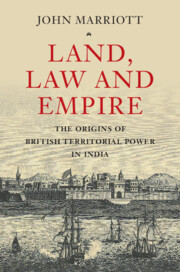
- Coming soon
- Publisher:
- Cambridge University Press
- Expected online publication date:
- August 2025
- Print publication year:
- 2025
- Online ISBN:
- 9781009602099

In this innovative exploration of British rule in India, John Marriott tackles one of the most significant and unanswered questions surrounding the East India Company's success. How and when was an English joint stock company with trading interests in the East Indies transformed into a fully-fledged colonial power with control over large swathes of the Indian subcontinent? The answer, Marriott argues, is to be found much earlier than traditionally acknowledged, in the territorial acquisitions of the seventeenth century secured by small coteries of English factors. Bringing together aspects of cultural, legal and economic theory, he demonstrates the role played by land in the assembly of sovereign power, and how English discourses of land and judicial authority confronted the traditions of indigenous peoples and rival colonial authorities. By 1700, the Company had established the sites of Madras, Bombay and Calcutta, providing the practical foothold for further expansion.
‘Marriott makes a valuable and decisive intervention in the ongoing debate around the way we conceptualise and characterise the East India Company's expansion in Asia in the early modern period. He skilfully reorientates the debate towards the all-encompassing issue of the Company's quest for territory in India, unspooling the complex negotiations and accommodations of the seventeenth century between the English and the Indigenous powers of the subcontinent. In a work of serious scholarship and impressive archival research, Land, Law and Empire reveals how the Company and its servants acquired the key foundations of later Imperial British power in India: Madras, Bombay, and Calcutta.'
David Veevers - Bangor University
‘By carefully scrutinizing the legal precedents and authorities to which the East India Company's agents in South Asia turned in the century before the Battle of Plassey, Land, Law and Empire convincingly demonstrates that the early modern roots of British imperialism lay as much in questions of law and land as they did in matters of trade and commerce.'
Douglas M. Peers - University of Waterloo
 Loading metrics...
Loading metrics...
* Views captured on Cambridge Core between #date#. This data will be updated every 24 hours.
Usage data cannot currently be displayed.